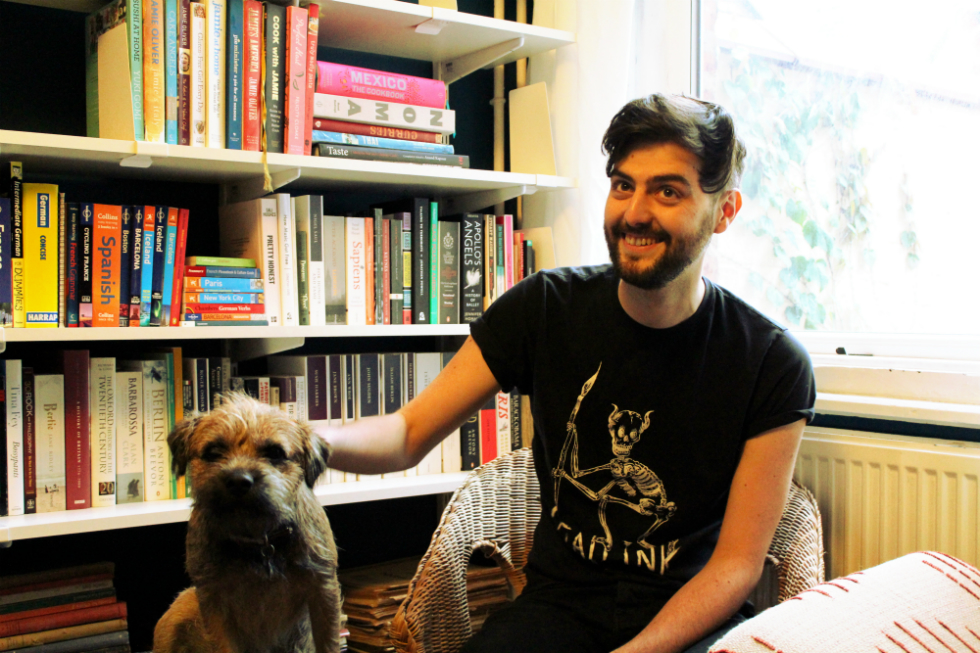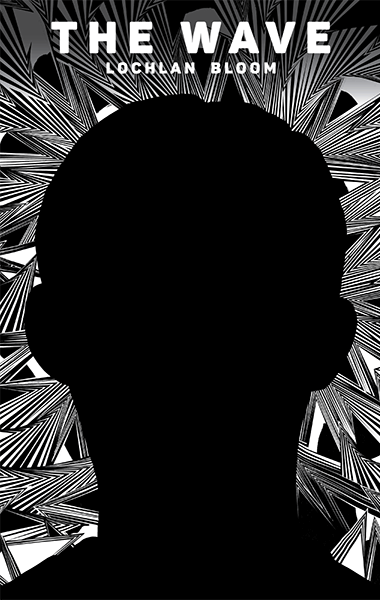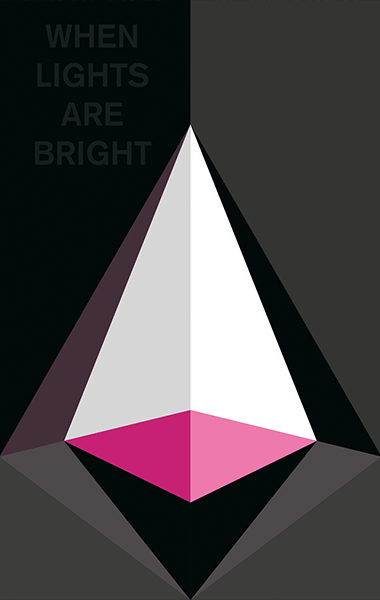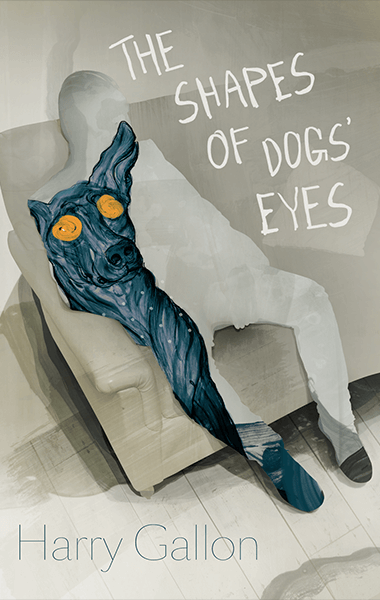“We need more publishers of all shapes and sizes” – Introducing: Dead Ink

He’s a man after our own heart: a book lovin’, indie publishin’, self-starter. But how to grow after five years in the business? Michael Lacey speaks to Dead Ink founder Nathan Connolly…
Indie publishers Dead Ink Books, based in Liverpool, has been slowly building a reputation for supporting exciting new fiction since its founder Nathan Connolly started it “on a shoestring” back in 2011. Experimental and ambitious, their recent books have attracted attention from The Saboteur Awards, The Guardian’s First Book Award and Not The Booker Prize.
The Double Negative spoke to Connolly about his innovative and disruptive methods, the pressures (and benefits) of going it alone, and what he thinks will happen as he teams up with two other disruptive publishing houses…
The Double Negative: Hi Nathan! Please tell us a little about Dead Ink.
Nathan Connolly: Dead Ink is an independent publisher of literary fiction supported by Arts Council England. We focus on new and emerging authors, with the aim of taking debut writers on and sticking with them throughout their career. The idea has always been to be in it for the long run with our authors.
We started as a digital-only press and have progressed from there to paperbacks and eventually hardbacks. We came into publishing because of digital technology and though we’ve evolved, we’ve always relied on that connectivity with our readership.
How did you get started in publishing?
After I graduated, I spent several years banging my head against the wall trying to get into publishing. I was sat around on JSA [Job Seekers Allowance] or working odd jobs, being told I had to work unpaid. My background meant that an unpaid internship in London wasn’t an option for me, and, unfortunately, that is for the most part the only route in. I had the bright idea of creating my own internship — I’d show them I could be a publisher by publishing books. I carried on until eventually I was running an independent press of some notoriety. It was literally easier for me to set up my own publishing house than get into traditional publishing.
What can you tell us about Dead Ink’s forthcoming projects?
We’re about to enter a really important time for Dead Ink. We’ve just received a huge Arts Council grant to expand our Publishing the Underground project, which uses crowdfunding as a way for readers to act as patrons to new authors. There’s also Know Your Place, a book of essays on the working class, written by the working class. We’ll be announcing details on that in the New Year. Finally, we’ve bought the rights to the archive of The Eden Book Society, which was run for nearly 100 years by the same family, publishing short horror books to a private subscription list. This is something really special; nearly a century of British horror writing that is almost entirely unread.

Know Your Place sounds particularly timely.
Know Your Place has probably generated more excitement than any other book we’ve announced. It is actually alarming how much desire there seems to be for this book and I think it acknowledges something that has been malingering in British society for a long time. We’ll be announcing details in the New Year, but so far the pitches we’ve received have been brilliant. One pitch alone prompted an hour-long discussion in an editorial meeting that resulted in tears and fond remembrances.
Do you feel there’s a pressure on emerging authors to focus on certain issues that are seen as having a particular contemporary relevance – and does this factor into your decision making at all?
I’m a fan of art that immediately dates. As in, art that dates so rapidly it becomes a strength rather than a weakness – I think it achieves a sort of timelessness. It also reflects on our current culture quite aptly, I think. A book takes a long time to produce and booksellers are moving towards wanting information on titles 12 months before they are published. In that kind of environment, yeah, I enjoy the book as a tool of contemporary relevance. But it goes both ways. Some things are universal and that’s usually where books are best.
Overall, I try not to let it influence how I select authors. This topic quickly breaks down into: “Is all art political?”… And that can get messy unless you liberate what “political” has to mean. A book should be relevant, culture should be relevant. Otherwise, we fall into it just being a distraction. Should a book have to be about Brexit? No, but that referendum happened and it is now shaping the world we live in. Your book should be relevant to that, even if it is abstracted.
You’re currently based in Liverpool after a stint in Manchester – how has this relationship with the North affected Dead Ink?
Well, we’ve just teamed up with Comma Press, And Other Stories, and Peepal Tree Press, to form The Northern Fiction Alliance. The Arts Council supported the alliance through their international showcasing fund and the aim is to highlight the North of England as a centre of excellence for publishing. A lot of attention gets paid to London publishing because that is where the establishment is, but the really exciting stuff is happening in the North, where independents are leading the way.
In London there are internships, but in Manchester there was a group of people who knew that if they wanted to work in the arts it was going to be hard work, and they were going to have to build it themselves. That attitude proliferates across the North. To an extent, it was the Northern community that created Dead Ink. Every step of the way someone has helped us along and given us advice or support. That’s what the Northern Fiction Alliance is about and something we’re going to continue.

What do you see as the big problems facing the publishing industry at present?
Oh god! This is a big question and the answers begin with the technical and slowly grow to encompass problems that we have as a society. In some ways, publishing is better than most industries in accepting its flaws and knowing that is has to try harder. Everybody who I have ever met who works in publishing has always had the best intentions and been a great person. Most of them want the world to be a better place and they firmly believe that literature and art can help with that. That being said, publishing needs to be more open and address the fundamental issues of access that prevent many from working in publishing or being published. This is beginning to be addressed, but it needs to be more systemic and far-reaching.
Publishing, as an industry, is far too concentrated and conglomerated. Indies are thriving at the moment and that has to be seen as a kickback against the past few decades of convergence and amalgamation. We need more publishers of all shapes and sizes and we need to see them more geographically dispersed. I imagine most of the big publishing houses aren’t interested in leaving London and that’s fine — I love London — but if they’re not going to do it, then the Indies are. Already, we’re seeing plenty of them move away from the capital and I’d love the North to present itself as a real alternative. We might not have the money that London has, but we do have the talent and we do have the passion.
Crowdfunding is an integral part of Dead Ink’s operation in quite a unique way – how did this come about?
It is a truth universally acknowledged that 99% of books bomb and leave you with a hole in your budget. It doesn’t matter how good or pretty they are either. A lot of books get published every year and the overwhelming majority of them fail to even begin breaking even. The big publishers rely on one-in-100 being so successful that it makes up for the losses made by all the others. That might work for them, but it isn’t really a sustainable model for an independent where we pretty much live or die on each book.
The point of Publishing the Underground, our crowdfunding project, was to take away some of that risk. If every book is a risk then you naturally start to take on safer and safer books. We never wanted to publish safe books, so we had to find another way of alleviating that risk. Crowdfunding enables us to cover a lot of the costs – not all – before we commit the bulk of our cash to a print-run. If we can meet some of those minimum targets then we don’t need to be quite so conservative with the types of books that we publish.
Overall, we want readers to feel empowered and understand the impact that their purchases have. We’re in the North; there’s no fat-pocketed arts-angel patron coming along to feed struggling authors, but we can support each other. Hopefully, when someone supports a new Dead Ink author through Publishing the Underground, they understand that they are taking the place of that mythical figure and becoming a real patron. They’re directly supporting new art and a new artist’s career.

You mentioned recently being awarded a large grant from the Arts Council – going forward, how will this affect your operations?
Dead Ink began on a shoestring and this grant will be the first step in growing beyond that and developing us into a much bigger organisation. We have a new website coming that will be something pretty special, and our branding needs overhauling. They will probably be the most publicly visible changes. It also gives me a bit of space to start thinking more long-term. The grant covers 18 months and during that time we can make plans for the future. A lot of indie publishers don’t make it past their first year – we’ve technically been around for five now. I think we’ve proved that we might actually have something vaguely worthwhile going on, and this grant is about expanding that and turning it into something much more significant.
What past Dead Ink projects are particularly close to your heart?
The first book we published in print was SJ Bradley’s Brick Mother. It was a stunning debut that should have gotten 10-times the readership than it did, but at that point we still had a lot to learn. Next year, we’re going to be publishing her second book, and it will be the first time that we’ve taken an author from their debut to their second novel. I’m really excited about that landmark and proud too. SJ is a brilliant author that could probably find a big publisher now, but she seems to believe in us just as much as we believe in her. That’s something really special and I think it is going to be a big book for us.
In practical terms, how do you find exciting young authors? Via open calls, direct enquiries, industry recommendations, or other means?
We use a combination of all of the above. A recent call for short story submissions left me with nearly a million words to read. Most of the good work we receive comes through recommendations from peers. That could be other authors, people working in the literature sector or other publishers. We try to keep up an active approach to outreach and I speak at universities and festivals around the country. Overall, looking at who we have published in the past, the best approach seems to be authors who have made contact with us and maintained a dialogue. Open submissions are notoriously bad for filling your inbox with crap, but we have still found some great authors that way. I suspect though, when a million words hit your inbox, the chance of getting lost or missed isn’t too unfathomable.
When people think about a book being published they probably consider printing, maybe cover design, and think it is a pretty cheap endeavour. We’re a little indie and we invest around £10,000 in each novel that we publish. That’s a lot of money, and a good percentage of it comes from the Arts Council. When we publish a book, there is a lot we have to consider, especially with debuts, so submitting once through an open submission probably isn’t your best chance of success. Talking to us and our peers on a regular basis and being an active participant in the writing community is going to get you a lot further.
Finally – what books have inspired you recently?
Okay, I won’t list Dead Ink titles here, but there are loads of really, really great writers at the moment. Too many to list. I just finished reading Vertigo by Joanna Walsh. Everybody needs to read this book, if only to quietly sit back and be amazed by the talent on show. I had a similar reaction to All The Birds Singing by Evie Wyld. I went into both books pretty much blind and as soon as I started them I just felt in awe. I’m already thinking of more that I should list, but I’m going to leave it there.
Michael Lacey
For more information on Dead Ink Books or to browse available titles, visit their website, regularly updated with interviews and extracts
Read more about Publishing the Underground: crowdfunding for brand new novels
Images, from top: Dead Ink founder Nathan Connolly; Dead Ink titles The Wave by Lochlan Bloom, When Lights Are Bright by Wes Brown, and The Shapes of Dogs’ Eyes by Harry Gallon





